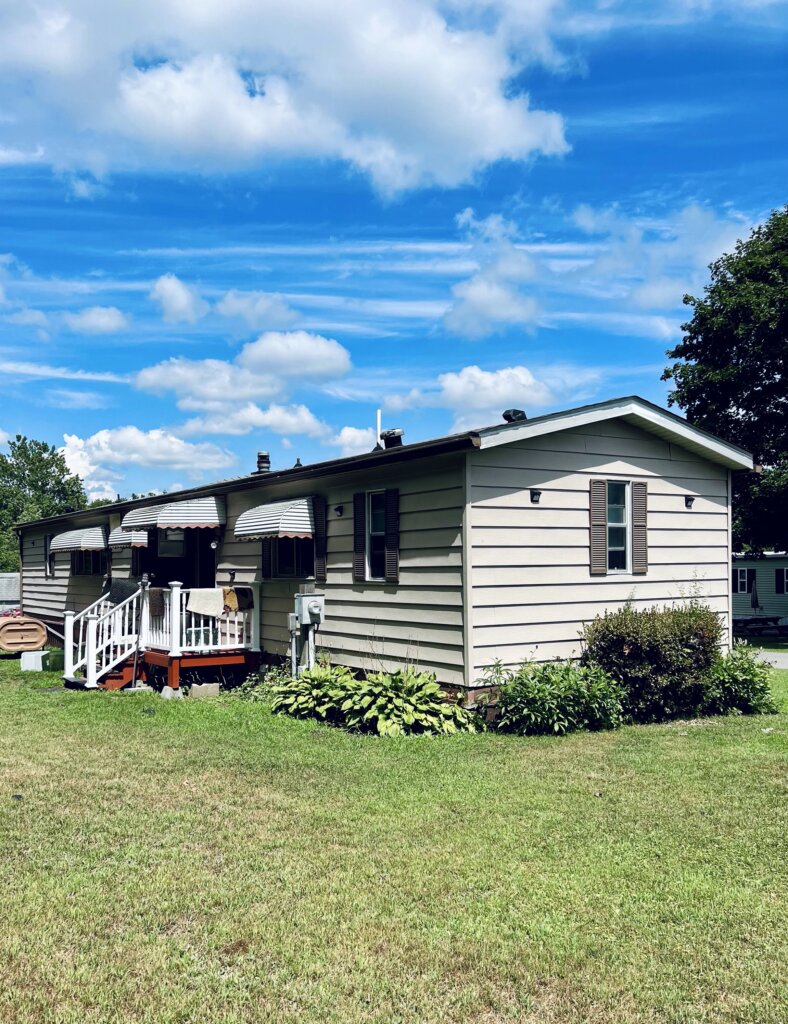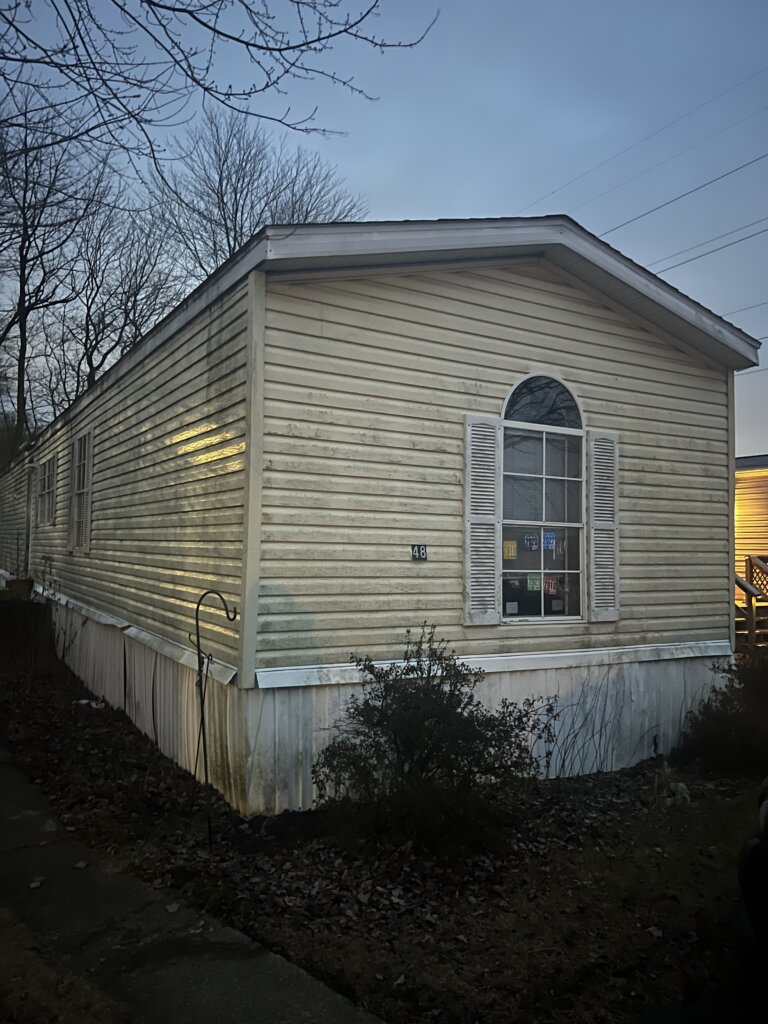Are you selling your mobile home or interested in purchasing a mobile home from the previous owner? In both situations you will need to sign and file a mobile home title transfer.
What is a Mobile Home Title Transfer?
A mobile home title transfer is a legal `document that transfers ownership of a mobile home from one person to another. While it may sound simple, this process is handled differently from the other forms of property and differs from state to state.
Depending on the location of the mobile home, state law may dictate that the mobile home should be treated like real property such as a brick and mortar home, or like a vehicle. In cases where the mobile home title is being transferred with the land it sits on, the process becomes more complicated.
Mobile Home Title Transfer in PA
Mobile Home Title Transfer in NJ
Mobile Home Title Transfer in NY
Where to Start the Transfer Process
The office responsible for mobile home title transfer varies depending on the state. If your state treats mobile homes as real property, you may be required to visit the Department of Housing. If the mobile home is treated as a vehicle, title transfer is more likely to occur at the Department of Motor Vehicles.



How to Transfer a Mobile Home Title
Transferring a mobile home title can be done by following these main steps.
- Decide Your Terms
Before you can transfer your mobile home title, you need to determine what the terms of the exchange will be. If you’re selling a mobile home, you simply can state a price that you agreed on with a with a buyer. In cases of inheritance* or other reasons for transferring, there may be additional requirements that have to be met before the transfer takes place.
- Gather Your Documents
The process for title transfer for mobile homes may differ from state to state, and there might also be variations between counties, so be sure to familiarize yourself with requirements for your area. Common Documents include:- Tax Certificate
Proof that property taxes have been paid on the mobile home may be required. You can obtain this information at the local taxing authority. - Title Application
If your state requires a title application, it will need to be filled out and signed by the buyer and, in some cases, both parties. - Bill of Sale
This document will serve as proof that the buyer and seller have agreed on the sale of the mobile home. It will generally include the mobile home’s serial number or VIN, buyer and seller information, purchase price, purchase date, and signatures of buyers and sellers. Some states will require notarization of this document. - Lien Release
If the mobile home is subject to any outstanding liens, the seller must secure a lien release with proof of pay-off. - Warranty Deed
If your state is one of the handful that recognize mobile homes as real property, a warranty deed will be required to transfer title.
- Tax Certificate
- Sign the Documents
The next step is ensuring you’ve signed all the required documentation and gone over every step of the sale. Remember, signing isn’t just transferring the mobile home, it’s facilitating all aspects of the transaction. If there’s something about the exchange you need more information on, or aren’t happy with, withhold your signature until you can make necessary changes to the agreement.
Depending on a state your mobile home is in, you might need the transfer to be notarized, ensure you schedule a date and time where a notary can be present. - File the Transfer
Congratulations, the mobile home and any money associated with the sale should have changed hands. Now you will need to file all of the documents to make the transfer official. Tip: you might want to make copies of the documents for your own records. If at any point some part of the transfer is contested, you now have the ability to quickly reference the original documents.
4 Common Mobile Home Title Issues
Common Mobile Home Title Issues & FAQ
1. The title is lost or missing.
Sometimes, the seller simply doesn’t know where the title is or it was lost during a fire or natural disaster. Unfortunately, you can’t proceed with the sale without the title.
Solution
If the current seller is the legal owner of record, then there is a simple and easy process to obtain a duplicate title. Call your local mobile home titling agency to inquire about specific steps moving forward. Typically the owner of record needs only to provide proof that he or she is the owner and pay a small fee.
2. The title is missing and the seller is not the actual owner.
In some cases, when a new buyer closes on a mobile home, they do not immediately transfer the title into their ownership due to various reasons. However, legally the buyer is not the true owner until the title is registered into his/her name, or an entity they control.
You will see occasions when buyers and sellers have “transferred ownership” via a separate piece of paper known as a bill of sale. A bill of sale acts as a meeting of the minds and as a receipt typically given when selling personal property.
While this process may be sufficient for the buyer, seller, and even park manager, it is not sufficient enough to transfer legal ownership from one person to another. The original owner is still the legal owner and can come back any time to take possession of his or her home.
Solution
Solving this problem depends on whether the owner is available. If the owner is available, you must contact them immediately. They often agree to obtain a duplicate copy of the mobile home title(s) if you pay for a small fee. It is in their interest to obtain a copy for you, otherwise they’re liable for taxes or accidents on a property that they didn’t think they still owned.
In case when owner is not available (passed away), check to see if you can contact the owner’s power of attorney or immediate family. If so, you will likely be able to obtain a duplicate title by filing the correct forms with your state. You also might consider asking your state about the best course of action to obtain legal ownership. Keep in mind that obtaining clear title may or may not be possible.
3. The title is present, but the seller is not the actual owner.
This scenario is the most common hurdle you will see as a used mobile home investor. In situations like this, your seller will be in physical possession of the current original mobile home title. However, it may or may not be signed and dated by the current buyer(s) and seller(s). For instance, this may occur if the seller received the mobile home and title from their parent but never actually legally completed the transfer.
Be aware that most states charge a late fee for delaying the transfer of a mobile home title from a buyer to a seller if not completed within X number of days. This late fee will be paid when the title is eventually transferred into the new buyer’s name.
Solution
If the true owner on title has already signed on the seller’s line, then simply have your seller sign as buyer and quickly transfer the title into their name. Once the seller is the actual owner, they can now transfer their clear title to you without worry. Call your state to verify that this double transfer can be completed in one day.
If your seller has a title that is signed by the owner but the buyer’s signature lines are blank, it can be tempting to skip over your current seller and transfer the title from the legal owner straight to you. Most states consider skipping the chain of title illegal. Do this at your own risk.
The true owner must sign on the seller’s line before the title can be legally transferred into the purchaser’s name. Track down the legal owner to have his or her signature placed on the seller’s line.
Never forge documents. If you can’t find the legal owner, it may be tempting for you or your seller to forge the legal owner’s signature on the title. Some people can rationalize that as a victimless crime. With that being said, it is still a crime and illegal.
4. The title is present, but there are liens still showing.
If there are active liens still on the title, then the owner will not likely be in physical possession of the home’s title(s). It is most common for the lien holders to physically hold the title(s) until they are paid off in full. At this point, the state issues a new title showing zero active liens. Alternatively, the lien holder may signs a “Release of Lien” on the title or a separate form. Both of these methods show the home is free and clear from debt.
Make sure to do your own due diligence. Always call your state to verify the mobile home’s VIN or serial numbers and confirm if there any active liens. Some states will have this information at their fingertips. Others aren’t as technologically advanced.
Solution
Some mobile home sellers possess their title despite active liens. Is this an error? Or do they still owe money on the mobile home?
Stay with them as they call the bank or loan servicer to confirm a payoff. Once you know the amount of the lien, you can decide to move forward accordingly.
Go the extra mile to solve a seller’s problem. This way, you’ll compete with fewer investors and buyers. Determined investors working with motivated sellers can typically come to legal win-win solutions that accomplish the goals of all parties.
Sell Your Mobile or Manufactured Home On Your Terms
How to Transfer Mobile Home Title After Owner’s Death
In this case, the documentation for transfer of ownership has two sections:
- The portion that the previous owner has to fill, and
- The part where the new owner completes the information
If the previous owner is dead, a death certificate will be required as evidence, and the stand-in will need to confirm I.D. and relation. Of course, this is subject to state laws, regulations, and circumstances.
Is there a Will?
Mobile homes may be left to a beneficiary in a will. Most states allow the executor or administrator of an estate to transfer ownership of a mobile home after probate is concluded. If the estate does not pass through probate, survivors or next of kin can transfer the title. In contrast, probate-free estates can provide new titles to beneficiaries.
No Will or Probate?
The surviving spouse can inherit an estate without a will and no probate. If there is no surviving spouse, the next of kin can own a mobile home. In either case, the relative must complete the form and provide a copy of the deceased’s death certificate.
Probate Without Wills
Courts appoint administrators to manage the assets of estates that go through probate without wills. In most states, the estate administrator is allowed to transfer ownership of the mobile home. Generally, a deceased person’s closest living relative will inherit the mobile home by state law.
Frequently Asked Questions About Quitclaim Deeds and Divorce
Many divorcees have questions about how to use quitclaim deeds to straighten out ownership of real estate after the divorce. The following is a list of frequently asked questions and answers.
How do I remove myself or my ex-spouse from title to our former marital home?
To remove a person from title to real estate, you will need a deed. A deed transfers property from one or more person to one or more other persons. In the divorce contexts, both spouses will sign a deed transferring the former marital property to only one of the ex-spouses. The spouse that receives the property will continue to own the property. The other spouse has no interest in the property.
What type of deed should I use to transfer property to or from an ex-spouse?
There are several deeds you could use. In most cases, divorcing spouses will not want the liability associated with making a warranty of title. For these reasons, most ex-spouses transfer property to each other by quitclaim deed.
When should I sign a quitclaim deed transferring property to my ex-spouse?
The deed is used to transfer the property as required by the divorce documents. Only sign a quitclaim deed once there has been a final divorce decree and/or a settlement agreement approved by the courts. You may also require, as a condition of your transfer of the property to your ex-spouse, that you be released from the mortgage or deed of trust associated with any loan on the property.
Can my ex-spouse enter our home after he or she has signed a quitclaim deed transferring the home to me after our divorce proceeding?
No. Once the divorce is final and the home has been transferred to you by quitclaim deed, your ex-spouse is no longer an owner and has no right to enter the property other than by your invitation and consent.
Can a Notary Public Notarize a Mobile Home Title Transfer?
A notary public can notarize a mobile home title transfer, but all necessary documents still need to be filed with the appropriate departments. Even if your state does not require the exchange to be notarized, doing so is highly recommended as it involves a third party who can give evidence during disputes.
